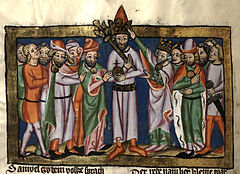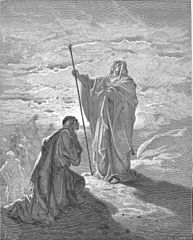 Today’s lection begins a foray into the complex world of early Israel’s changeover from the ecstatic leadership of the period of the Judges (approximately 1200-1050 BCE) to the time of the kingship. It is a rocky change, as the following tales make plain. Its rockiness occurs due to multiple factors, but primarily it has to do with the flawed characters involved in the changes of government. I know well that many read these stories as simple ones, featuring a fully trustworthy prophet, Samuel, a deeply anxious and dangerous people of Israel, and a haunted and deranged first king, Saul. A more careful reading of chapter 8 of 1st Samuel, and the succeeding chapters, calls each of those simplistic characterizations into serious question. I wish to suggest that the author of these ancient tales was less intent on giving his readers models for behavior, whether good or bad, than he was on sharing the rich complexity of human interactions that all human beings experience. These grand stories, that probably predate Homer, and certainly were written before the great Greek plays and vastly influential philosophy of Plato and Aristotle, offer remarkable insight into behavioral motivations that far outstrip any simplistic answers, suggested by overly pious and pablum-like sermons, no matter how sincere.
Today’s lection begins a foray into the complex world of early Israel’s changeover from the ecstatic leadership of the period of the Judges (approximately 1200-1050 BCE) to the time of the kingship. It is a rocky change, as the following tales make plain. Its rockiness occurs due to multiple factors, but primarily it has to do with the flawed characters involved in the changes of government. I know well that many read these stories as simple ones, featuring a fully trustworthy prophet, Samuel, a deeply anxious and dangerous people of Israel, and a haunted and deranged first king, Saul. A more careful reading of chapter 8 of 1st Samuel, and the succeeding chapters, calls each of those simplistic characterizations into serious question. I wish to suggest that the author of these ancient tales was less intent on giving his readers models for behavior, whether good or bad, than he was on sharing the rich complexity of human interactions that all human beings experience. These grand stories, that probably predate Homer, and certainly were written before the great Greek plays and vastly influential philosophy of Plato and Aristotle, offer remarkable insight into behavioral motivations that far outstrip any simplistic answers, suggested by overly pious and pablum-like sermons, no matter how sincere.
Samuel has been a judge in Israel for decades. Not only has he served as conduit for the voice of YHWH as prophet, he has also served as military leader, high priest, and political head over Israel. In short, he has been king but without that name. All Israel has looked to Samuel for leadership in all facets of their lives. But now the prophet has become old, and realizing that his time on the earth is short, he attempts to ensure a continuity of leadership by making “his sons judges over Israel” (1 Sam.8:1). It seemed the obvious move to make; who better than the great Samuel to choose his successors, and who better than the prophet’s own sons to serve in that role? But there is a huge problem; the two boys, Joel and Abijah, are foul creatures. They have been sent to exercise their judgeship in Beersheba, in the far southern deserts of the land, by way of seasoning before they assume full leadership of Israel after their father’s death. “Yet, both sons did not walk in the ways of Samuel. They turned toward violent profit, taking bribes, and perverting justice” (1 Sam.8:3). These two scoundrels are better fit to lead a pack of thugs, not the chosen people of YHWH. So the people are having none of it.
“You are old, and your sons do not follow in your ways; appoint a king to govern us like other nations” (1 Sam.8:5). “But the thing in Samuel’s eyes was evil, when they said to give us a king to judge us,” making plain that the people had had their fill of judges, seeing that the newest judges among them were noxious and useless. The question to ask at this point is: exactly why does Samuel find the people’s request “evil,” a very strong condemnation.? Traditionally, he is enraged due to his extreme piety as representative of YHWH, and that could surely be part of the problem. After all, only YHWH can be king in Samuel’s eyes. A request for an earthly king is an overt rejection of God! Besides, if Israel has a king, they will lose their special status as being led only by God, and not by some mortal, and possibly a dangerous and vicious mortal at that. However, I doubt that is Samuel’s full motivation for finding the people’s demand evil. If there is a king, specifically to “judge” them, Samuel’s long life of leadership is not merely over but demeaned and potentially forgotten altogether. Not only that, but the dynasty he has established through his sons will be negated and sidelined and with it all memory of the great prophet will disappear. Samuel’s craven attempt at a dynasty continues long into the story, long after Saul has been made the king. At 1 Sam.12:2, the angry prophet is still touting the availability of his sons for leadership, even while he is supposedly renewing Saul’s kingship! It is more than plain that the very last thing Samuel wants is a king for Israel.
He angrily enjoins YHWH in prayer, demanding that YHWH upbraid the people for their request for a king. But YHWH does not do that. What YHWH does is tell Samuel to make a king for them, as they have asked (1 Sam.8:9), but also tells the prophet to warn them just how terrible kings can be. Now that is a job that Samuel relishes, and he creates a speech that in broad strokes and colors describes the monstrousness of kings, from their abusive behaviors, their greed, their absurd demands on all their people (1 Sam.8:11-18). He concludes with a furious cry against the call for king, claiming that after the king has plundered and abused them unmercifully, “you will cry out because of your king, whom you have chosen for yourselves, but YHWH will not answer you that day” (1 Sam.8:18)! One can almost see the venom dripping from Samuel’s words as he lacerates the people in the name of his God.
But the speech has no apparent effect on the people who remain “determined to have a king over us, so that we may also be like other nations, and that our king may govern us and fight our battles” (1 Sam.8:19-20). Though traditional readings have attacked the people for their lack of faith and trust in YHWH, their request might as well be seen as quite a reasonable one. The Philistines have entrenched themselves on the coast of the land, and Samuel has not been able to defeat them absolutely. And now that the prophet is old, and has chosen his rancid sons as successor judges, they feel that must have another system in place, avoiding Joel and Abijah, if they are to survive the coming days. Other nations have successful kings; why not Israel?
Upon seeing their recalcitrance, Samuel again turns to YHWH in prayer, perhaps expecting his God to approve the fury of the prophet’s speech, and to assault the fools who continue to demand a king. Again, YHWH surprises both Samuel and us. “Listen to their voice,” says YHWH, “ and set a king over them” (1 Sam.8:22). There is no divine approval of Samuel’s cankered address, and there is no rationale given for YHWH’s reasoning concerning the required king. Samuel, if he is prophet of God, must now choose a king over Israel, since he has been told twice by YHWH to do precisely that.
He does not! He turns to them and thunders, “Each of you go home” (1 Sam.8:22). He will not choose a king, not now, not ever. The drama ends in silence. It will not be until the next chapter of the tale that a king will appear, a king who is thrust into Samuel’s own presence by YHWH, who again makes it clear that Samuel will make someone king, as YHWH has demanded, and that someone turns out to be the tallest, most handsome man in the land, Saul the son of Kish.
Samuel is a man just like us; his motives are multiple as he only half-listens to his God, as he at the end of this part of the story flat refuses to do what YHWH asks him to do. This characterization of the prophet makes us wonder whether his dealings with the new king, whom he only with deep reluctance crowns and affirms, will be based strictly on his idea that YHWH hates kings or is rather based on his own deep hatred of them, given his displacement as leader over Israel and the rejection of his own sons as his successors. The brilliant writing we witness in this chapter prepares us for more careful assessments of the main characters of the long drama to unfold. Keep your eyes peeled as we continue deeper into this grand tale; we may find something of ourselves over and again lurking in these wonderful pages.
(Images from Wikimedia Commons)











